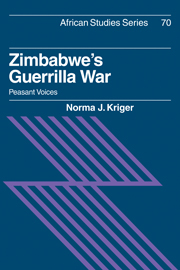Book contents
- Frontmatter
- Contents
- List of maps
- Acknowledgements
- Introduction
- 1 Peasant revolutions: theories and methods
- 2 Inequalities and peasant grievances
- 3 Strategies, goals and appeals: continuity and change
- 4 Guerrilla–civilian relations: the issue of popular support
- 5 Struggles in the struggle
- 6 Legacies of the war for peasants
- 7 Conclusion
- Appendix: Field research
- Notes
- Bibliography
- Index
- Other books in the series
Appendix: Field research
Published online by Cambridge University Press: 05 January 2012
- Frontmatter
- Contents
- List of maps
- Acknowledgements
- Introduction
- 1 Peasant revolutions: theories and methods
- 2 Inequalities and peasant grievances
- 3 Strategies, goals and appeals: continuity and change
- 4 Guerrilla–civilian relations: the issue of popular support
- 5 Struggles in the struggle
- 6 Legacies of the war for peasants
- 7 Conclusion
- Appendix: Field research
- Notes
- Bibliography
- Index
- Other books in the series
Summary
Field Research
Because of the importance of subjective factors in field research, discussed in chapter 1, the appendix provides additional information that may or may not have bearing on my findings. My field experiences also help to convey something of the atmosphere at the time in Zimbabwe.
Choosing peasant participation in the war as a subject of study
When I went to Zimbabwe at the end of 1981, I intended to examine how international sanctions had affected the domestic political system. By doing so, I hoped to fill a lacuna in the literature that focused on the economic impact of sanctions. But all my presuppositions about why it should have been a propitious time for such a study were contradicted by the realities in Zimbabwe. The atmosphere in Zimbabwe in 1981 was charged with an excitement about the possibilities of development, and I found myself drawn to the rural areas where many held that the hopes for a future Zimbabwe free of the chains of neo-colonialism lay. The armed struggle had left these areas physically ravaged, but scholarly accounts converged on how the war in ZANU's areas of operation had resulted in a remarkable political mobilization that had helped the guerrillas to create ‘semi-liberated’ or ‘liberated zones’. The well-organized party structures that had been established seemed to promise that at independence there would be a nationalist party with a grassroots presence.
- Type
- Chapter
- Information
- Zimbabwe's Guerrilla WarPeasant Voices, pp. 243 - 248Publisher: Cambridge University PressPrint publication year: 1991

